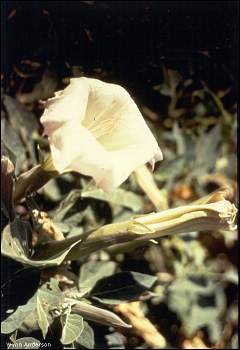
One of the most arresting blooms of the Chihuahuan Desert is that of Jimson Weed. The large, trumpet-shaped, white flowers are things of beauty—yet this plant may well kill more humans than any other native herb of our desert.
Jimson Weed is a member of the potato family, and like many members, contains powerful toxic alkaloids. In the past, the plant was used in some Native American shamanistic rites to induce visions, and building on this knowledge, many a young person in our drug-oriented society has experimented with the plant—often with serious to fatal results. Not only do people vary greatly in their reactions to the alkaloids, but different plants may have vastly different strengths, and the same plant varies in potency through time. These are deadly combinations.
However, the poisonous foliage is put to good use by the caterpillars
of the hawkmoth. Its larvae are immune to the ingested toxins—poisons that are
incorporated into their bodies. Predators undiscerning enough to prey on them quickly
learn that this is not your everyday tasty morsel.
![]()
Contributor: Arthur H. Harris, Laboratory for Environmental Biology, Centennial Museum, University of Texas at El Paso.
Desert Diary is a joint production of the Centennial Museum and KTEP National Public Radio at the University of Texas at El Paso.

Jimson Weed (Datura) plant in bloom. Photograph by Wynn Anderson.